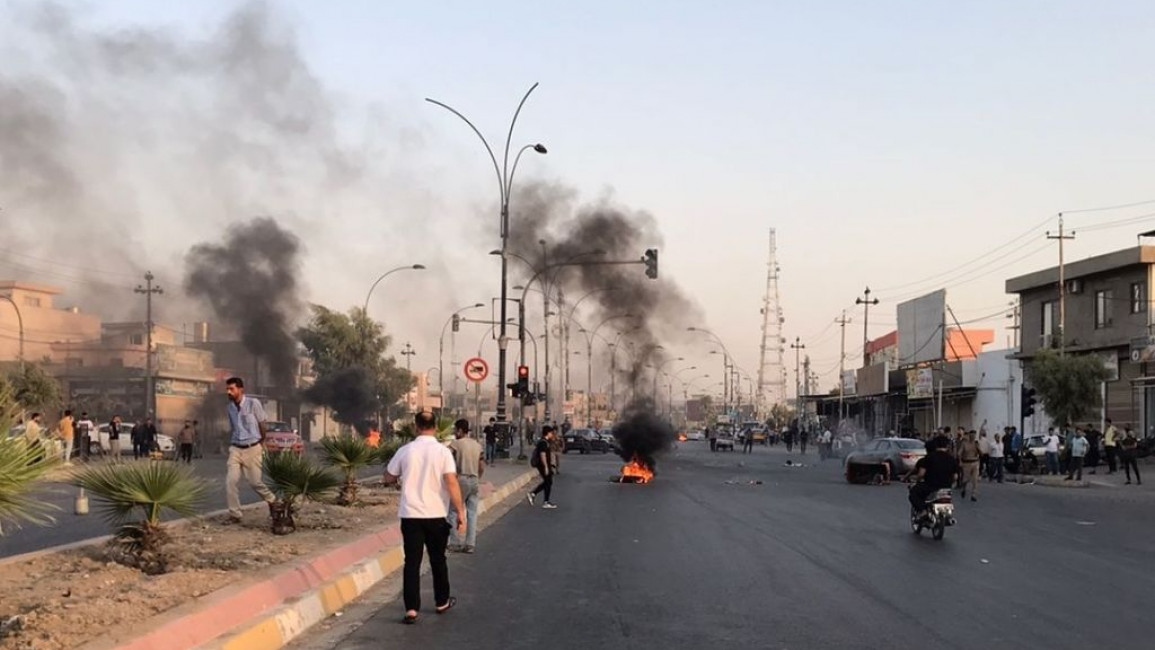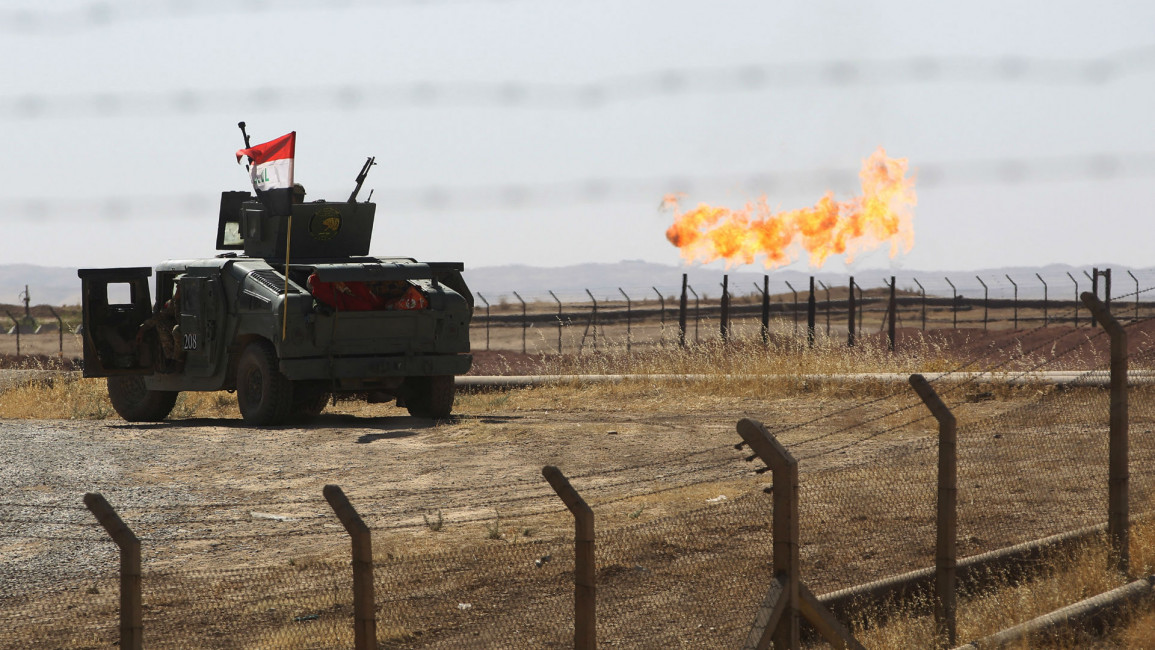
What is driving ethnic tensions in Iraq's Kirkuk?

The future stability of Kirkuk in northern Iraq hangs in the balance as Kurdish, Arab, and Turkmen communities grapple with historical grievances and competing claims, igniting concerns both locally and on the international stage.
Kirkuk, a multi-ethnic and oil-rich province in northern Iraq, is a historically disputed area between the Iraqi federal government and the Kurdistan Regional Government (KRG).
The Kurdistan Democratic Party (KDP) and peshmerga security forces took control of Kirkuk in 2014 before being expelled in 2017 by federal troops following a referendum on Kurdish independence, with the KDP vacating its headquarters. Since then, they have been used by Iraqi security forces.
"The future stability of Kirkuk in northern Iraq hangs in the balance as Kurdish, Arab, and Turkmen communities grapple with historical grievances and competing claims"
Recent tensions first began late in August when Arab and Turkmen communities in Kirkuk protested against Iraqi Prime Minister Mohammed Shia al-Sudani's order for the Iraqi military’s Joint Operations Command (JOC) to hand over their headquarters, located in the Kurdish-populated Shoraw neighbourhood, to the KDP.
Protestors blocked the Kirkuk-Erbil highway and established sit-in tents, creating traffic jams and forcing drivers to use Shoraw’s streets to go to Erbil. Kurds in Shoraw and other areas held a counter-demonstration and asked local authorities to reopen the highway, saying the blockage had damaged their businesses. Soon after, the rival demonstrations turned violent.
“Iraqi security forces appear to have opened fire on demonstrators without prior warning in Kirkuk on September 2, 2023, killing at least 4 people and injuring 16,” Human Rights Watch said in a statement on 8 September.
According to reports, four Kurds - three civilians and an unarmed peshmerga fighter from the Patriotic Union of Kurdistan (PUK) - were killed, reportedly by gunfire from Iraq's security forces.
“The recent tensions in Kirkuk are the result of a culmination of several factors, including a general chauvinist sentiment against Kurds in Kirkuk, the recent visit by Turkish Foreign Minister Hakan Fidan to Iraq, his meeting with the Turkmen factions, and his statements that Kirkuk is a Turkmen city; plus, the upcoming provincial election in the city,” Massoud Abdul Khaliq, head of the Standard Kurd media institution, told The New Arab.
For the first time since 2005, provincial elections will be held in Kirkuk by 18 November.
“Those who blocked the road and were against the return of the KDP to Kirkuk were the KDP’s close allies both in Baghdad and in Erbil. Kurdish people are surprised and cannot understand why they are doing this. I think it is related to the elections, and often the KDP, Arabs, and the Turkmen serve each other’s interests in the city.”
|
|
Following the deadly incident, Sudani ordered the formation of a fact-finding committee and pledged that those responsible would be "held accountable".
Families of the deceased told local media that their loved ones were killed by heavy machine gun fire, most likely from armoured vehicles deployed by the Iraqi army in Kirkuk.
Iraq’s Federal Court has now temporarily suspended the planned handover of the Iraqi federal police headquarters to the KDP.
Iraq’s ruling alliance, the State Administration Coalition, held a meeting in Baghdad on 10 September attended by Sudani and the speaker of the parliament. The coalition, which backed Sudani for Iraq’s premiership in October 2022, has agreed to send a “leadership committee” to Kirkuk to find solutions to the recent problems, particularly the issue of the headquarters, and make administrative adjustments.
"For the first time since 2005, provincial elections will be held in Kirkuk by 18 November"
According to Article 140 of Iraq’s constitution, the Iraqi government is obliged to normalise the situation in Kirkuk and other disputed territories and hold a census and a referendum to determine whether the people of these areas want to remain under Iraqi government authority or join the northern Kurdish region.
The article had set a clear deadline for the referendum - no later than 31 December 2007 - however the vote remains unimplemented to this day.
In an interview aired on state-run Al-Iraqiya television on 12 September, Sudani admitted that tensions in the city were related to the provincial elections, “distrust”, and the lack of harmony among the city’s ethnic groups due to longstanding issues.
Sudani criticised those within the State Administration Coalition that had signed off on his cabinet’s agenda, which includes an item that headquarters in Kirkuk, Nineveh, and Diyala provinces must be handed over to the relevant parties.
“I told the parties; you have an agreement, why are you saying we are agreed and in secret every party moves [...] consequently civilians pay the price and it leads to casualties and martyrs,” Sudani said, in a clear indication that the protests in Kirkuk were politicised.
As per Sudani’s cabinet policy, Rakan Saed al-Jabouri, the acting governor of Kirkuk since 2017, should have been replaced by a Kurdish governor. However, he has remained in the post due to political rivalries between the KDP and the PUK over the position.
“All have agreed on the KDP's return, but what we are seeing these days is pure election fever and both Sunni Arabs and Turkmen are using the issue to recharge their people with ethnic-based narratives to gain attention and win votes in the elections,” Karokh Nuraddin, the Director of Media and Public Relations at the University of Kurdistan Hewlêr (UKH) told TNA.
“Sunni Arabs don’t want to lose the governor’s position, but Turkmen are also not happy at not having a Turkmen governor since 2005 while Kurds and Arabs have occupied the position ever since.”
|
|
In provincial elections held in 2005, Kurds secured 26 out of 41 seats, Turkmen won nine, but Sunni Arabs only won six seats as most of the community boycotted the political process.
TNA contacted Kirkuk police, as well as officials and lawmakers from the Arab and Turkmen communities in Kirkuk, but they were either unwilling to talk on the issue or were unavailable.
Analysts Karokh Nuraddin and Massoud Abdul Khaliq both say that Kurds will likely win a majority in the provincial elections in Kirkuk.
“This majority largely depends on the KDP’s active participation in the upcoming elections. Since they won two out of 12 parliamentary seats in the latest elections and the longstanding majority power (PUK) only won three, it’s expected that the KDP will get a lot of votes and will become a big power,” Nuraddin predicted.
"It is not easy for Erbil and Baghdad to reach meaningful and sustainable agreements on Kirkuk without pressure and intervention from either the US or the regional powers, Iran and Turkey"
“Given their relations with Turkey, the KDP also has a chance to forge an alliance with the Iraqi Turkmen Front (ITF) and consequently other Kurdish parties, offering a few senior positions and securing the next governor for the Kurds.”
Responding to the latest crisis, the US State Department has urged Iraqi and Kurdish authorities to seek a resolution through dialogue and uphold Iraq's constitution in the face of escalating tensions in Kirkuk.
Turkish Foreign Minister Hakan Fidan, meanwhile, told a joint news conference with his Iranian counterpart Hossein Abdollahian on 3 September that, "we are saddened and concerned over tensions that have resulted in the loss of lives in Kirkuk, which is the ancestral homeland of our Turkmen kin".
The Iranian FM, for his part, stressed the need for further security cooperation between Iran and Turkey in Iraq and Northeast Syria, predominantly ruled by the Kurdish Democratic Union Party (PYD) which is seen by Ankara as an extension of the Kurdistan Workers Party (PKK). Fidan also claimed that the PKK has an increasing presence in Kirkuk.
“It is not easy for Erbil and Baghdad to reach meaningful and sustainable agreements on Kirkuk without pressure and intervention from either the US or the regional powers, Iran and Turkey," Karokh Nuraddin, the Director of Media and Public Relations at the University of Kurdistan Hewlêr, told TNA.
"This looks very unlikely at the moment and even for the foreseeable future. Interethnic politics in Kirkuk is also a big obstacle that hinders solutions for the city.”
Dana Taib Menmy is The New Arab's Iraq Correspondent, writing on issues of politics, society, human rights, security, and minorities.
Follow him on Twitter: @danataibmenmy




